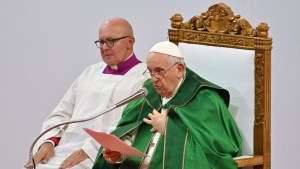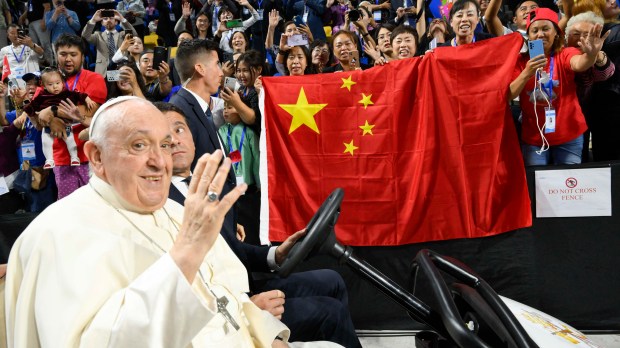In a symbolic gesture at the end of the Mass celebrated at the Steppe Arena in Ulan Bator, Mongolia, on September 3, 2023, the Pope took by the hand the bishop of Hong Kong, Stephen Chow, who will be created cardinal on September 30, along with his predecessor, John Tong-Hon. In a direct message to the authorities of the People’s Republic of China, the Pope invited Chinese Catholics to be “good Christians and good citizens.”
To the rapturous applause of the faithful present, the Pope invited the Bishop of Hong Kong and the Bishop Emeritus, Cardinal John Tong-Hon, to join him – the other Bishop Emeritus of the former British colony, Cardinal Joseph Zen, 91, was absent. The Pope then asked to take the microphone to address China directly, which clearly surprised even his own liturgical assistants.
I would like to take this opportunity, in the presence of these two brother bishops – the Emeritus of Hong Kong and the current Bishop of Hong Kong – to send a heartfelt greeting to the noble Chinese people. I send my good wishes to them all: always move forward, always advance! And to Chinese Catholics: I ask you to be good Christians and good citizens. To all of you, thank you.
said the Pope, joking that he’s delighted to have brought together “a Jesuit and a Salesian.” (Bishop Stephen Chow is a Jesuit, like the Pope, while Cardinal Zen is a Salesian.)
The Pope thus addressed the heart of the issue that Chinese authorities have with faithful Catholics, seeing their loyalty to Rome as at odds with their ability to be citizens of China.
The Pope’s unexpected appeal comes against a particular backdrop, as for several years now, his discretion in the face of the repression of pro-democracy movements in Hong Kong has earned him criticism. In addition, the 2018 agreement between the Holy See and the People’s Republic of China on episcopal appointments, although renewed in 2020 and 2022, seems to have borne little fruit, with many dioceses remaining vacant or in an uncertain canonical situation.
On July 15, the Holy See made public the appointment of Bishop Joseph Shen Bin as Bishop of Shanghai, but this transfer had been decided several weeks earlier by the Chinese authorities without consulting Rome. Rather than a formal appointment, it was a recognition of a fait accompli.
In this context, the forthcoming cardinalical creation of the current Bishop of Hong Kong, Stephen Chow Sau-yan, on September 30, appears to be an important gesture, making this new cardinal a veritable mediator between Rome and China.
Known for his diplomatic finesse, Archbishop Chow has succeeded both in gaining the confidence of his predecessor Cardinal Zen, despite the latter’s reputation as a virulent opponent of the 2018 Agreement, and in establishing relations with mainland China. In particular, he visited Beijing last April to meet the archbishop of the Chinese capital and strengthen exchanges between the dioceses of Beijing and Hong Kong.
The Argentine Pontiff’s spontaneous declaration aroused great emotion in the stadium, giving his trip to Mongolia a special dimension and resonance far beyond this steppe country. I.MEDIA’s special correspondent noted that some of the Chinese faithful in the hall shouted “Ciao ni hao viva il papa,” a mixture of Italian and Chinese that can be translated as “salut, bonjour, long live the pope!”
Thank you and rejoice
Pope Francis, after Cardinal Marengo’s word of thanks, also thanked the Mongolian people for their hospitality.
Your Eminence, you reminded us that in the Mongolian language the word for “Thank you” comes from the verb “to rejoice.” My own “Thank you” dovetails perfectly with this marvellous insight of the local language, for it is full of joy. It is a great “Thank you” to the Mongolian people, for the gift of friendship that I received in these days, for your genuine capacity to value even the most simple aspects of life, to wisely preserve relationships and traditions, and to cultivate daily life with care and attention.
Tribute to Father Teilhard de Chardin
At the end of the Angelus prayer, the Pope also paid tribute to the French Jesuit Pierre Teilhard de Chardin (1881-1955), who was involved in geological research in China from the 1920s onwards and was recognized as one of the most brilliant minds of his time, but was suspected of heterodoxy in the eyes of Rome.
On the contrary, the first Jesuit pope in history has highlighted the vision of the Eucharist of the author of Mass on the World.
“To celebrate Mass in this land brought to my mind the prayer that the Jesuit Father Pierre Teilhard de Chardin offered to God exactly a hundred years ago, in the desert of Ordos, not far from here,” the Pontiff explained, quoting these words by the French Jesuit: “My God, I prostrate myself before your presence in the universe that has now become living flame: beneath the lineaments of all that I shall encounter this day, all that happens to me, all that I achieve, it is you I desire, you I await.”
The French Jesuit “fervently desired to celebrate Mass, but lacked bread nor wine,” Francis explained, presumably alluding to the situation of many Catholics deprived of the Eucharist in China and other Asian countries marked by restrictions on religious freedom and a lack of missionaries.
He continued:
This priest, often misunderstood, had intuited that “the Eucharist is always in some way celebrated on the altar of the world” and is “the living centre of the universe, the overflowing core of love and of inexhaustible life” (Laudato Sì, 236), even in times like our own, marked by conflicts and wars. Let us pray this day, then, in the words of Father Teilhard de Chardin: “Radiant Word, blazing Power, you who mould the manifold so as to breathe life into it, I pray you, lay on us those your hands – powerful, considerate, omnipresent.”


